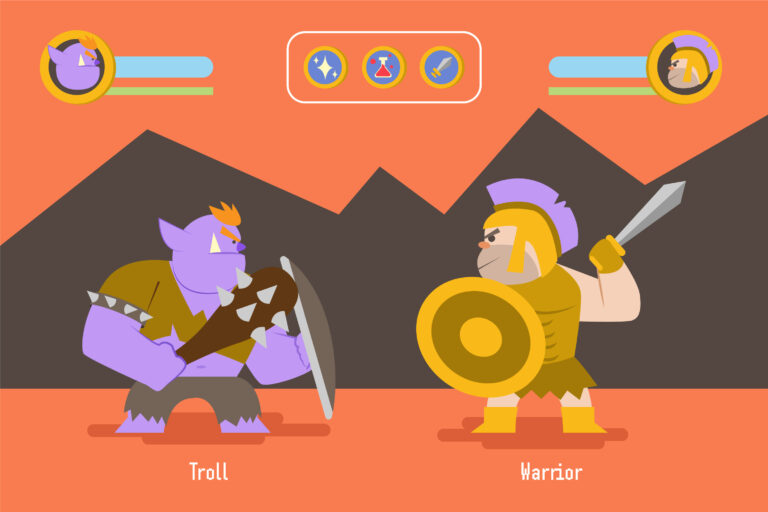Video games come in an incredible variety of styles and gameplay experiences. Over the decades, distinct genres have emerged that each offer their own flavors of interactivity. Game genres help players understand at a glance what kinds of challenges and experiences a game will offer. In this guide, we’ll explore the most popular video game genres and their subgenres and highlight some notable examples of each.


Need Game Art Services?
Visit our Game Art Service page to see how we can help bring your ideas to life!
1. Adventure Games
Adventure games emphasize story, exploration, puzzle solving, and inventory management over action. Players uncover the narrative at their own pace through point-and-click interfaces or 3D worlds. Puzzles test players’ logic and inventory management skills.
Popular Subgenres:
Text Adventure / Interactive Fiction
The players can command something such as “take lamp” or “go west” to progress through a world composed only of text using logic and problem-solving. There are no graphics and the interactions, narrative, and choices made by the player dictate how to play.
Examples: Zork, Enchanter, Planetfall, Counterfeit Monkey by Emily Short
Graphic Adventure / Point‑and‑Click
Users interact with the game by clicking on an object or area to interact, merging an intuitive UI with inventory management, dialogue-based puzzles and multiple choice scenes. This subgenre matured during the 1990s with various LucasArts and Sierra games.
Examples: The Secret of Monkey Island, Broken Sword, The Longest Journey
Visual Novel
These games focused heavy on narrative, using static images and/or animated scenes or anime styled art, with gameplay limited to dialogue and brief decisions with possibly a branching path or several different endings.
Examples: The House in Fata Morgana, Doki Doki Literature Club, Phoenix Wright: Ace Attorney
Interactive Movie / FMV Adventure
This would utilize filmed or pre-rendered video clips and require players to make choices or timing button presses embedded in cutscene segments. While often criticized for limited agency, the goal of these titles is to create informative cinematic experiences.
Examples: Night Trap, Double Switch, Heavy Rain, Dragon’s Lair
Real-Time 3D / First‑Person Adventure
Players are free to move and explore realistic 3D environments with modern visual and physics design features. Puzzles and narrative occur in an immersive first-person geography rather than on static screens.
Examples: Myst, Riven, Syberia, Obduction
Walking Simulator
The focus is entirely about interacting with the environment for a narrative purpose via exploration, without any combat or fail states. They primarily exist to create mood, memory, or emotion through reduced gameplay with increased story immersion.
Examples: Dear Esther, Gone Home, What Remains of Edith Finch, Firewatch
Puzzle‑Adventure (Myst‑Style)
These feature mixtures of exploration in an interactive environment with elaborate logical or mechanical puzzles in surreal or atmospheric landscapes. They generally emphasize player discovery and non-linear puzzle, rather than story via dialogue.
Examples: Myst, The Witness, Quern: Undying Thoughts, Zork Nemesis, Zork Grand Inquisitor
Escape‑Room Adventure
In these games, players start in an enclosed space or locked room and must solve a set of chained logic puzzles based only on the available surrounding. This sub-genre is rooted in browser or mobile gaming, clearly representing real-world “escape room” scenarios.
Examples: 999: Nine Hours, Nine Persons, Nine Doors (Zero Escape series), No Sleep For Kaname Date (AI series)
2. Action Games
Action games test and reward players’ reflexes, hand-eye coordination, and reaction time. The gameplay is fast-paced, with a focus on combat, explosions, and epic moments. Popular subgenres include shooters, fighting games, hack and slash, and more.
Popular Subgenres:
First‑Person Shooter (FPS)
Players experience the world through the eyes of a protagonist that participates in fast, ranged combat with a focus on aiming, movement and switching weapons. Most action games focus heavily on multiplayer deathmatches, and also singleplayer campaigns, and reward players’ spatial awareness and reaction time.
Examples: Half‑Life, Doom (1993), Call of Duty: Modern Warfare, Battlefield series
Third‑Person Shooter (TPS)
Combat occurs behind-on our camera-character, merging shooting, character motion and cover mechanics, and still provides more spatial context than an FPS experience for maneuvering and movement performed in a cinematic action fashion.
Examples: Gears of War, Resident Evil 4, Uncharted, Warframe, God of War Series
Platformer (Action Platformer)
Players jump or climb, or even dodge their way through dangerous platforming sections while defeating enemies, while also requiring time-sensitive movement precision. Levels often combine platforming traversal obstacles with action sequences, or the player is confronted by enemies.
Examples: Celeste, Hollow Knight (platformers); Risk of Rain 2 merges traversal and shooting in 3D
Beat ’Em Up / Hack‑and‑Slash
Players experience attack waves of enemies through side-scrolling or arena-based melee combative sequences, through combos and weapons. Hack-and-slash is its melee-focused evolution, highlighting how stylishly the player can attack while controlling the crowds.
Examples: Double Dragon, Streets of Rage 2, Battletoads, Scott Pilgrim vs. The World
Fighting Game
Titles that feature one-on-one combat where players use combos and special moves in closed arenas under time and precision constraints. Character differences and match-up mastery are the basis for competitive, or esport, play.
Examples: Street Fighter, Tekken, Mortal Kombat (culturally known core titles)
Stealth Action
Encourages the player to evade detection, using shadow, cover, and distraction, rather than being a brute force combat; rewards observation, silent kill, and non-lethal planning for completion.
Examples: Metal Gear Solid, Splinter Cell, Thief, Deus Ex
Action‑Adventure
Combines fighting systems, exploration, environmental puzzles, and story through an open, or semi-open, world. There is a combination of scripted cinematic set-pieces in gameplay and more contextual puzzle-solving.
Examples: Uncharted, The Last of Us, Tomb Raider (common representative titles)
Survival Action
Forces players to manage resources (like ammo, or health) as they fight threats in open or procedural world maps. Success requires tactical retreat, scavenging, and shooting to fight in stressful situations.
Examples: The Long Dark, DayZ, The Alters
Looter Shooter
Hybridizes shooting in real-time, providing procedurally generated gear and loot progression systems. Players level up their gear based on random drops within these rewarding combat links, which leads to progressively harder content.
Examples: Destiny 2, Borderlands, Warframe
Rhythm Action
Hybridizes action timing, taken on musical beats – where players press buttons with on-screen beats to score. While not a fighting game, success requires precision and reflexes.
Examples: Dance Dance Revolution, Guitar Hero, Beat Saber (classic rhythm-action staples)
Battle Royale
Mass multiplayer matches drop dozens to hundreds of players on maps, taking on zones that shrink over time, rewarding players who survive as they recede. The game hybridizes scavenging and competition in gunplay with a winner or winning team.
Examples: Fortnite, PUBG, Call of Duty: Warzone
3. Sports Games
Sports games let players experience their favorite sports virtually on the field and as a manager. Controls and rules mirror professional sporting events with varying degrees of realism. Management modes also allow guiding a franchise to championships. This game genre is always a trend in the video game industry.
Popular Subgenres:
Simulation Sports
Realistic games with physics, full team control capabilities, and licensed leagues. These games are released yearly, with updated statistics.
Examples: FIFA, NBA 2K, and Madden NFL put you in the player’s shoes for accurate virtual match play.
Arcade Sports
Fast and flashy! The rules simplify or exaggerate in the name of explosive, instant gratification and over-the-top action.
Examples: NBA Jam’s high‑flying dunks and NFL Blitz’s hyper‑physical NFL football epitomize the fun‑first aesthetic.
Management / Franchise Sims
Players operate as the general manager, doing trades, training, scouting, finances, and establishing the team’s strategy behind the scenes.
Examples: Football Manager and Out of the Park Baseball offer deep systems where gameplay happens off‑the‑field.
Multi‑Sport / Exergames
Assemblages of mini-games across various sports, organized around motion controls, or casual, non-structured play loops to have the widest market appeal.
Examples: Wii Sports and Nintendo Switch Sports let you swing, bowl, or kick without specialized control schemes.
Extreme Sports
Skateboarding, snowboarding, BMX, etc., and focus on tricks and risk, not realism, relate to these non-team events.
Examples: Tony Hawk’s Pro Skater and Steep deliver big air, combo scoring, and scenic death‑defying stunts.
Combat Sports
These games broadly simulate professional combative sports – like boxing or MMA – but with an emphasis on realism compared to the standard fighting game.
Examples: EA Sports UFC and the Fight Night series recreate real‑world pugilistic action with licensed rosters.
4. Simulation Games
Simulations replicate real-world activities, from piloting vehicles to running a business. Some aim for utter realism, while others take the artistic license of game art services for fun and accessibility. Management, construction, sports, and vehicles are common subjects.
Popular Subgenres:
Construction & Management (CMS)
You design, grow, and manage cities, zoos, or businesses—balancing expansion, employees, and resources with no “combat” objectives.
Examples: SimCity, Cities: Skylines, RollerCoaster Tycoon, Planet Coaster.
Business / Tycoon Simulation
Focuses on managing a company or enterprise—from theme parks and railroads to coffee chains—while managing finances, pricing, and operations.
Examples: RollerCoaster Tycoon, Capitalism II, Planet Coaster, Two Point Hospital.
Life Simulation (Social / Farm / God Sims)
You direct avatars in their routines, relationships, careers, or ecosystems in systems with NPC demands and improvisational stories.
Examples: The Sims 4, Animal Crossing, Stardew Valley, Spore.
Vehicle Simulation
Models real-world machines, like planes, cars, trucks, and trains, with realistic physics, controls, and transportation and logistics systems.
Examples: Microsoft Flight Simulator, Euro Truck Simulator 2, Train Sim World, Assetto Corsa.
Sports Simulation
Digital versions of real sports using licensed leagues and real rules, often with team or career management modes.
Examples: FIFA, NBA 2K, Madden NFL, Wii Sports.
Simulation Shooter / Military / Tactical Sim
The games mimic combat realism—ballistics, fatigue, unit coordination, and damage—that take place in high-fidelity environments.
Examples: Arma, Squad, IL-2 Sturmovik, World of Tanks.
Medical & Other Specialist Simulations
Players perform surgery, manage hospitals, or manage policing, photography, or space missions—often mechanically procedural and task-oriented.
Examples: Trauma Center, LifeSigns, Two Point Hospital, Pokemon Snap.
5. Platformers
Platformers are 2D, side-scrolling games challenging players to run, jump, and climb through perilous courses. Hazards and enemies must be overcome with precise timing and dexterity. Platformers dominated early gaming and remain popular today.
Popular Subgenres:
Traditional 2D Side‑Scrolling Platformers
Characters in video games navigate left to right in a 2D plane; characters jump, climb and avoid hazards in sequential stages. Mastering enemy patterns and traversal through fluid movement and hazard memorization are key components of playing these games.
Examples: Super Mario Bros., Sonic the Hedgehog
Puzzle Platformers
Players use jumping and dexterity paired with logic or spatial puzzles and, sometimes, occasionally lose progress due to the “trial‑and‑death” design approach. Overcoming failure while teaching the critical mechanics of gameplay is a powerful element of learning through difficulty.
Examples: Limbo, Inside, Portal
Run‑and‑Gun Platformers
These games layer on constant gunplay over top of platform jumping. Instant reflexes and pattern recognition skill over the enemies are compensated for a player’s successful progression. The games biggest challenge is for players to successfully compose evasive movement while keeping a precise aim over short fast-paced side-scrolling sequences.
Examples: Contra, Metal Slug, Gunstar Heroes
Metroidvania (Exploration RPG Platformers)
You obtain new areas of a vast interconnecting map through upgrades that allow for new abilities such as wall‑climbing or double jumps. Progression is non-linear as the player must backtrack with new tools to expose hidden paths and challenges.
Examples: Castlevania: Symphony of the Night, Hollow Knight
Cinematic Platformers
The game structure is defined by lifelike animation, contextually rich story features and cinematic pacing that creatively employ rotoscoping and/or pre-rendered visuals. The challenge of gameplay is a little slower and more methodical with functionally frequent player checkpoints as well as a trail-based progression mechanic versus twitch-based platforming.
Examples: Prince of Persia (1989), Out of This World (a.k.a. Another World), Flashback
3D Collect‑a‑Thon / Collect‑and‑Complete Platformers
Set in open 3D hubs where players are rewarded with tokens and/or items to retrieve (acquire) access to additional areas in new game worlds. Progress is recorded as a percentage of completion for the player to pursue discoverable or collectible challenges as soon as they gain (new defined access) (new gain) new access.
Examples: Banjo‑Kazooie, Super Mario 64, Yooka‑Laylee
Endless Runner Platformers
The character runs automatically while players tap to jump or slide under obstacles in procedurally generated levels. The goal is high‑score survival—typically in short sessions—reinforced by incremental speed increases and endless variation.
Examples: Canabalt, Temple Run, Subway Surfers
6. Role-playing games (RPGs)
RPGs have players customize characters with unique skills, items, and abilities. Rich stories unfold through exploration, quests, and side activities. Combat blends strategic party management with action, turn-based, or tactical systems.
RPG is a gaming genre where players assume the roles of characters and progress through stories or quests.
Popular Subgenres:
Action RPG
From beginning to end, these are games focusing on the infantry of the player, employing instant action-heavy combat and loot collection. Indeed, it is the character development and the action that take precedence over story and character interaction.
Examples: Diablo, Path of Exile, Mass Effect, The Witcher Series
Western RPG (CRPG)
Mostly called computer RPGs, they allow for character customization because the game world and quests are open for exploration before players engage in choice-driven narratives. The mechanics are complex, with multiple paths and most of the quests are morally ambiguous.
Examples: Fallout, Baldur’s Gate, The Elder Scrolls
Japanese RPG (JRPG)
Largely linear, story-intensive, JRPGs usually revolve around predetermined characters, turn-based fighting systems, and in all good measure, developed screenplays. Presentation is very animated/manga–like in aesthetic, rich in stylization.
Examples: Final Fantasy, Dragon Quest, Persona
Open‑World / Sandbox RPG
These games grant players expansive open–ended worlds along with numerous side quests catering to a non-linear game–play style. These play hosts to emphasis on exploration, player freedom, and long game times.
Examples: The Elder Scrolls V: Skyrim, Fallout 3, Dragon Quest XI
Tactical RPG (SRPG)
A turn–based system controlling battle on grids determines weapon placement and unit skills based on a player‘s tactics. Thus, the question of strategy rather than individual skill has neither weight nor emphasis, with permadeath and class systems complex in many cases.
Examples: Fire Emblem, Final Fantasy Tactics, X–COM
MMORPG
Massively multiplayer RPGs, or MMORPGs are games played in online worlds shared by hundreds or thousands of players, where they band together or battle in cooperative (and competitive) environments such as quests, raids, and social guild designs, and they progress in the game using gear, skill, and social prestige, usually via persistent economies.
Examples: World of Warcraft, Final Fantasy XIV, Eve Online
Roguelike / Roguelite
These RPGs employ procedural generation of levels, turn–based gameplay, and a form of permadeath or at least high–risk repeat play. Subsequent roguelikes strictly use original designs and rules, while roguelites may have varying degrees of permadeath and more expansive long–play style of progressive feature.
Examples: NetHack, Tales of Maj’Eyal, Rogue Legacy, Diablo
Dungeon Crawler ("Blobber")
Often in a first-person view (though not always) with a party that moves as a single unit through complex mazes where discoveries and experiences revolve around loot, mapping, puzzle–like traps, and systematic exploration.
Examples: Wizardry, Bard’s Tale, Legend of Grimrock
Monster‑Taming RPG
In these games, players use creatures they collect, train, and battle, with usually the ability to capture the creatures as they explore the world, so they would progress in these games through creature stats and training over a number of creatures, not through a single character.
Examples: Pokémon series, Megami Tensei / Persona
7. Shooter Games
Shooters encompass any game where shooting weapons take center stage. Unlike precise FPS games, the shooter label can apply to a wide range of gameplay and game art styles featuring guns.
Popular Subgenres:
Military / Classic First‑Person Shooter
These games depict modern or historic battlefield combat with simple guns, grenades, and respawning mechanics. The focus here is on quick shooting engagements using realistic or cinematic war-themed levels.
Examples: Call of Duty, Battlefield, Medal of Honor
Tactical Shooter
Emphasizes on team coordination, cover usage, low health, and realism in resource scarcity when competing in small–scale strategic encounters. Most rounds will not permit respawning until the round resets—each shot is valued and the decision-making will have to be calculated.
Examples: Counter‑Strike 2, Rainbow Six Siege, Escape from Tarkov
Arena Shooter
Fast movement, small maps, power-ups, and mostly player-versus-player with violent encounters in limited combat places. Often designed with deathmatch style and frantic, skill-based play in mind.
Examples: Quake III Arena, Unreal Tournament
Hero Shooter
Team-based First–Person–Shooter with characters that are referred to as “heroes” and they have their own weapons, powers, and roles on the battlefield. Team success will depend on the planning of selecting heroes that fulfill complementary roles will time–of–use of abilities alongside gunplay/poker–style.
Examples: Overwatch, Apex Legends, Valorant
Looter Shooter
Shooter gameplay marries fast gunplay and gunplay randomized–loot rewards—players constantly optimizing and upgrading their character‘s gear to face tougher foes. Missions replay and rarity-based progression loops pour on the lengthy playability.
Examples: Destiny, Borderlands, Warframe
Immersive Sim (First‑Person Sim Arcade)
Game systems can provide opportunities for players to utilize creative tactics through player abilities, stealth, hacking, and environmental interaction as opposed to heavily scripted combat. Levels usually allow for several different playstyles, varying in the loudness and subtleness of their approach, and grant players agency by making changes to the level according to how players engage with the assets provided to them.
Examples: Deus Ex, BioShock, Prey
Boomer Shooter / Retro FPS
Modern games made through the lens of 1990s Doom or Quake – Extremely gun–heavy, and fast–paced, with overt retro–style. Bright color palettes and gaudy weapons, focusing gameplay above narrative and class progression.
Examples: Dusk, Ultrakill, Ion Fury, Doom (2016)
Battle Royale Shooter
Large-scale versus mode for 1 (or team) scavenging gear primarily within a progressively smaller safe zone until only one (team) is alive. Gameplay increases movement, map awareness, and survival tactics over lengthy play sessions to engage in the single map.
Examples: Fortnite, PUBG, Apex Legends
Sniper‑Focused / Stealth Shooter
Gameplay focuses on stealth, long-range (rifle), silent takedowns, and only engaging with their enemies (targets), one-at-a-time, while eliminating targets who do not know they are being targeted. Levels are usually open or maze-like and allow players to choose their infiltration and pacing options.
Examples: Sniper Elite 4, Hitman 3, Metal Gear Solid V
8. Action-Adventure Games
Action-adventure games blend combat, action sequences, and exploration with puzzle solving. Environments encourage exploration and often hide secrets for inquisitive players. Action-adventure offers a diverse catch-all genre.
Popular Subgenres:
Cinematic Action-Adventure
These types of games focus heavily on narrative and storytelling where scripted scenes and quick-time events shape an interactive movie like experience.
Examples: Uncharted series, The Last of Us
Action RPG (ARPG)
Utilizes real-time combat and RPG systems including aspects like player development and loot systems.
Examples: Horizon Zero Dawn, Batman: Arkham series
Open World Action-Adventure
Includes large open, non-linear spaces where players can explore and engage in different tasks and side quests.
Examples: Assassin‘s Creed series, The Legend of Zelda: Breath of the Wild
Metroidvania
Encompasses games in which players explore interconnected maps and acquisition of skills opens up spaces in the game inaccessible before.
Example: Hollow Knight, Axiom Verge
Survival Horror
Engages players resource management and environmental tension, also limits combat options.
Examples: Resident Evil series, The Evil Within
Stealth-Based Action-Adventure
Primarily disallows combat and rewards players who can stealth their way through obstacles and enemies.
Examples: Metal Gear Solid, Dishonored series
Hack and Slash
Features intense melee combat that is focused on dispatching or defeating large groups of enemies.
Examples: Devil May Cry series, Bayonetta
Grand Theft Auto Clone
Open world combat games that allow freedom, driving cars, and committing various crimes.
Examples: Saints Row series, Mafia series
9. Fighting Games
Fighting games pit players against each other in close-quarters combat. Players utilize combos, special moves, spacing, and psychology to outmaneuver the competition. Fast reactions and deep knowledge of movesets and matchups are rewarded.
Popular Subgenres:
2D “versus” fighters
These games take place on a strictly two‑dimensional plane—there‘s no sidestepping in or out of the screen—so the fundamentals come down to zoning, footsies, and precision combos. They typically use a six button layout (light/med/heavy punches and kicks) and heavily rely on zoning and anti‑air tools.
Examples: Street Fighter II / III, Mortal Kombat series, King of Fighters
2.5D fighters
Rendered in full 3D graphics, these games restrict movement to a linear plane—creating depth visually, but ultimately no change to side-to-side action. They can use cinematic camera angles and stage effects but retain traditional 2D mechanics such as quarter‑circle inputs.
Examples: Street Fighter IV, Mortal Kombat (post‑MK9), Marvel vs. Capcom 3
True 3D fighters
Full movement along the z‑axis (sidesteps, circular strafe, etc.) is the focus—players can attempt to evade attacks into/out of the screen while repositioning. Combos often depend on ring‑outs, or juggling against walls, and spacing strategies are about changing ranged melee, or parry-style deflections.
Examples: Tekken series, Virtua Fighter, Soulcalibur
Anime / “Airdasher” fighters
Fast–paced, combo–heavy systems typical of Guilty Gear or BlazBlue, with universal air–dashes, double jumps, air blocking, and wall air recovering. The game movement is extremely aerial; the neutral game has layered movement and aggressive aggression (sometimes referred to as “gatling“ combos).
Examples: Guilty Gear XX/Strive, BlazBlue central fiction, Melty Blood Actress Again
Tag‑team / “Hyper” fighters
Players select a team of 2–3 characters and can stock–in or stock–out in fresh members mid‑combo or to call assist moves. The base mechanic is synergy in using assists, “team supers,“ and to teleport/tandem switch characters: frantic, combo–driven momentum.
Examples: Marvel vs. Capcom 3, Dragon Ball FighterZ, Skullgirls
Platform fighters
These style mix fighters with platform‑er mechanics: multiple floating stages, stage variability, and knock–out zones instead of health bar depletion. Hits launch you offscreen; the primary goal is similar, but to knock your opponents off the map instead of draining health bars—stages are also often multi‑level.
Examples: Super Smash Bros. series, Brawlhalla, Rivals of Aether
Weapon‑based fighters
Each fighter has a unique weapon (sword, spear, axe) which define reach and tempo, emphasizing things like spacing, counter‑strikes, and disarming your opponent. Often allows for single hit kills or weapon breaks—where the actual combat difference is a clash of arms instead of hand–to–hand martial arts.
Examples: Samurai Shodown (SNK), Soulcalibur series, Bushido Blade
10. Real-Time Strategy (RTS) Games
RTS games task players with gathering resources, building armies, and defeating opponents in real-time without turns. Balance economic development with troop management in pitched battles across land, sea, and air.
Popular Subgenres:
Classic Base‑Building RTS
Focus on collecting resources, constructing buildings and units, and researching tech trees while in real–time. Victory is based expanding your economy, controlling the map, and staging macro-event attacks on opponents.
Examples: StarCraft franchise, Age of Empires II–IV, Command & Conquer trilogy
Tactical‑/ Micro‑Intensive RTS
Limited army caps, or upkeep costs, result in more tightly controlled unit organizations and tactical positioning for hero‑unit or squad highlights. Rather than mass armies, victory comes through micro–skilled play, through flanking and combining junto smaller squads together.
Examples: Warcraft III, Company of Heroes, Wargame: European/AirLand battle
Grand‑Scale or Macro‑Management RTS
These games have the largest unit counts and maps, and biggest economies, and they focus on large scale strategic planning. Economy and production pacing of units dominate gameplay, with the typical victory condition as building and main piece (units) an enormous war machine to win the match.
Examples: Supreme Commander, Total Annihilation, Cossacks 3
Real‑Time Tactics (RTT)
Stripped of base‑building or micro–management of resources, players only command pre–defined squads, as there is no base–building, and players are generally operating in combat scenarios. Focus has shifted to terrain, cover systems, and tactics on the battlefield, without economy/production as an element.
Examples: Myth: The Fallen Lords, Total War battles, Men of War
Hybrid RTS (Hero Units / Tower‑Defense Elements)
Combining base-building RTS, with RPG mechanics based on the progression of the hero, or some type of defense wave type mechanics. Players must juggle building, hero/items, or placement of towers within real–time.
Examples: They Are Billions, Warcraft III, Battle Realms
MOBA‑Derived / Hero‑Based RTS
Based on the foundations of real-time strategy (RTS), players control one hero unit in team battles to destroy the other team’s base.
Tactics are based on controlling the map, waves of AI units, and builds based on using a hero or items; it is less about economically micromanaging a base.
Example: Dota 2, League of Legends, Heroes of the Storm
11. Racing Games
Racing games allow players to speed through tracks and courses in high-performance cars, bikes, and other vehicles. Racing ranges from realistic simulations to off-the-wall arcade experiences. Multiplayer and competitive play features heavily.
Popular Subgenres:
Simulation‑Style Racing (Sim Racing)
These games focus on ultra-realistic driving by replicating the vehicle‘s physics like tire degradation and fuel consumption in addition to modeling suspension, and damage. They are a great option for players looking to immerse themselves in authentic motorsport—the few examples are Gran Turismo, Forza Motorsport, and iRacing.
Examples: Gran Turismo series, Assetto Corsa, iRacing
Semi‑Simulation / Touring‑Car Racing
The midfield game: a balance of realism and approachability; easier to play than proper sims but with a fair amount of technicality involved, offering varied tuning options, real–world vehicle characteristics, and lots of other technical processing involved. Forza Motorsport or Dirt Rally are examples of racing games that feel like racing sims, but are fairly accessible for players looking for a lighter experience.
Examples: Forza Motorsport, Project CARS, Colin McRae / Dirt series
Arcade‑Style Racing
Focuses on speed and over-the-top arcade–like gameplay with exaggerated physics, speed boosts, insane crashes, and an easy pick-up-and-play interface. Arcade racers often contain stunts, shortcuts, and huge wrecks—think Burnout or Need for Speed, games that fall under this niche.
Examples: Burnout series, Need for Speed, Carmageddon
Kart Racing
Fun and entertaining—typically featuring smaller, go-kart-like vehicles that race on crazy, colorful platforms and join in on crazy fun power-ups, weapons, and item pick–ups. The gameplay is a fun experience with the less focus given to accuracy—great for multiplayer experiences—Mario Kart and Crash Team Racing are classic examples!
Examples: Mario Kart series, Crash Team Racing, Sonic & All-Stars Racing
Street Racing
Set on urban streets and highways, usually featuring illegal racing, car customization, drifting challenges, and cop chases. Gritty stylized realism mixed with exploration of cluttered cityscapes – franchises like Nedar for Speed and Midnight Club are heavyweights.
Examples: Need for Speed, Midnight Club series, Blur
Off‑Road / Rally Racing
Focuses on dirt, mud, gravel, or rugged terrain using vehicles like rally cars, ATVs, or dirt bikes—often with dynamic weather and traction management.
Players navigate unpredictable stages and changing surfaces: Dirt Rally, WRC, MX vs. ATV highlight this style.
Examples: Dirt Rally, WRC: FIA Championship, MX vs. ATV series
Futuristic / Anti‑Gravity Racing
High-speed all the way on science fiction or anti-gravity vehicles on fantastical, gravity-defying tracks. Expect ludicrous velocities, and hyped–up power-ups—F-Zero, Wipeout, Redout provide extreme futuristic sensations.
Examples: F‑Zero, Wipeout series, Redout
Motorcycle & Motocross Racing
Typically, bike physics, and generally off-road elements; remains a combination of realistic road MotoGP titles, and stunt-focused motocross. Races focusing on balance, short corners, air tricks—think MotoGP, and MX vs. ATV Untamed.
Examples: MotoGP, Excitebike, MX vs. ATV series
Top‑Down / Isometric Racing
A classic or retro-view, where the lay of the track can be seen from above or at an angle; gameplay emphasizing some sort of strategy, drifting, or precision. Micro Machines, Rock ‘N‘ Roll Racing—all the nostalgic fun with tight controls and inventive tracks.
Examples: Micro Machines, Rock N’ Roll Racing, Super Sprint
Vehicular Combat / Combat Racing
Combines racing and casual vehicle combat—in using weapons, ramming, or through completely destructed environments, can block other contestants. Victory can come through often eliminations and/or sometimes just speed; classic series Twisted Metal and Destruction Derby.
Examples: Twisted Metal, Destruction Derby, Interstate ’76
12. First‑Person Shooter (FPS)
First-person shooters (FPS) portray gun-based combat from the visual perspective of the protagonist. Fast reflexes are key for aiming, movement, and weapon switching in frenetic firefights. FPS games are a pillar of multiplayer gaming today.
Popular Subgenres:
Military FPS
Realistic tactical first-person shooters based on the use of weapons in a tactical context, positioning of troops, and coordinating actions with a team.
Examples: Call of Duty: Modern Warfare, Battlefield 3/6, Insurgency: Sandstorm, Rainbow Six Siege
Hero FPS
Multiplayer shooters focused on players picking a pre-designed “hero” character that emphasizes team play, or character and weapon synergies.
Examples: Overwatch, Apex Legends, Valorant
Immersive Sims
First-person systems-driven games that offer nonlinear, emergent gameplay through environmental interactivity, player choice, and realistic world logic.
Examples: Prey (2017), Deus Ex, Thief, System Shock 2
13. Puzzle Games
Puzzle games challenge players’ logic, pattern recognition, and problem-solving skills. Completing puzzles and unraveling gameplay mysteries delivers intense satisfaction. Popular subgenres include physics, hidden objects, and matching puzzles.
Popular Subgenres:
Logic Puzzles
Utilize deductive reasoning and pattern recognition to solve challenges like number grids and logic grids.
Examples: Sudoku, Nonograms (Picross), Einstein’s Puzzle
Word & Trivia Puzzles
Players solve crossword puzzles, anagrams, word searches, or trivia to engage vocabulary and cultural knowledge.
Examples: Crossword puzzles, Word Search, Wordle-style games
Tile-Matching / Match‑Three
Manipulate a grid of tiles (swap, slide, or match) to create matches–with–three or more tiles to clear the tiles for points and combine the tiles.
Examples: Bejeweled, Candy Crush Saga, Zuma, Puzzle Quest (match‑3 + RPG)
Physics-Based Puzzles
Challenges that add working physics (gravity, mass or momentum, elasticity) to the equation, requiring players to either manipulate objects or complete various structures with realistic physics involved.
Examples: Cut the Rope, World of Goo, The Incredible Machine, Portal, Braid
Exploration / Escape‑Room Games
Point–and–click or immersive puzzles where players are detecting clues or evidence and solve larger, more complex, implicit puzzles to escape a room or environment.
Examples: The Room series, Myst, Limbo, The Dig
Hidden‑Object Games (HOPA)
Players are scanning the interactive scene or environment for specific objects, often built into gameplay with some mystery, narrative, or objective.
Examples: Mystery Case Files, Hidden Folks, Big Fish titles
Sokoban‑Style / Block‑Pushing
Grid-based challenges where you move cubes or boxes onto designated spots or targets, requiring players to think spatially about logic using a framework based on spatial logic and planning.
Examples: Sokoban, Baba Is You, Patrick’s Parabox
Construction Puzzles
Players are designing a functional product or structure–board, machine, bridge, Rube Goldberg or similar–type construction and applying puzzle physics to build it.
Examples: World of Goo, Crazy Machines, Bridge Constructor, Incredible Machine
Traditional / Jigsaw Puzzles
Digital versions of an analog puzzle that requires making spatial moves or placing, moving, and rotating the pieces to create a complete image, scenery, or art image. Typically relaxed and meditative to complete.
Examples: Digital Jigsaw puzzle apps, themed photo puzzles
Reveal‑the‑Picture Games
An image is covered by tiles or pieces to the point you do not see parts of the image you need to adjust to clarity visually– and if you are required to answer questions correctly, or clear parts of the image, you will build to progress missing parts of the puzzle image.
Examples: Quiz-based reveal apps, kids’ educational picture puzzles
14. Casual Games
Casual games feature simple rules and gameplay tailored to mass market appeal. Players of all backgrounds can easily pick them up and make progress regardless of skill. Short play sessions cater to mobile lifestyles.
Popular Subgenres:
Match‑3 / Tile‑Matching
Players align or swap tiles (generally 3 or more) on a grid to clear the tiles and earn points, often utilizing power-ups or level-based challenges in gameplay. These are largely attractive, simple to learn games, and are well-suited to casual and short play sessions.
Examples: Candy Crush Saga, Bejeweled
Hidden‑Object Games
Players also scan richly detailed scenes to find items on a list, while usually, the focus also includes light narrative or puzzle elements. It is an easy-going, observational style which is often framed inside of mystery or detective-themed games.
Examples: Mystery Case Files, Hidden Folks, Hidden Through Time
Hyper‑Casual Games
These are minimalist, mobile-first games that focus on 1 simple core-loop, like tapping or swiping, generally no tutorial, endlessly looping. These games are easy to play quickly, and cater to a lot of players, usually monetized through ads or subtle microtransaction.
Examples: Flappy Bird, Helix Jump, Fruit Ninja
Time‑Management Games
Players juggle tasks under time-pressures—serve a customer, cook a pizza, schedule—and try to achieve goals or be as efficient as possible. These games are exciting enough, but easy enough to focus on decision making in small, bite-sized sessions.
Examples: Diner Dash, Cooking Mama, Café Corner
Casual Puzzle Games
These often include logic or spatial puzzles, brain training, puzzles that are approachable yet satisfying, and typically get more difficult. They work well on mobile or desktop specifically, expect some higher order thinking while playing, but pretty low or zero stress.
Examples: Monument Valley, Brain Age, Logic Trainer
Social Simulation / Life Simulation
Players manage day-to-day life—style their homes, build relationships, farm, or edit the environment to a personalized vibe with little to no stress in a virtual world. These games are sometimes developer){community-driven, sometimes, character-driven, but there is also lots of space for free play, ease of play, creativity, and self-expression.
Examples: Animal Crossing: New Horizons, The Sims, Stardew Valley
Card & Board Game Adaptations
Digital editions of popular card or board games—solitaire, Mahjong, lottos—frequently with casual-friendly screen-oriented interfaces or levels.
They preserve the original rules but bring polish and convenience for casual play situations.
Examples: Slingo Quest, Monopoly Plus, Luxor Mahjong
Party Games & Minigame Collections
Compilations of many tiny, miscellaneous games, usually created for multiplayer play—often in a party or social situation. Every micro‑game is simple, quick, and designed for casual competition or cooperative play.
Examples: Mario Party series, WarioWare, Jackbox Party Pack
15. Strategy Games
Strategy games emphasize thoughtful planning, resource management, and grand decision-making over dexterity or reflexes. They reward analysis, creative problem-solving, and long-term strategic vision.
Popular Subgenres:
Real‑Time Strategy (RTS)
Players make decisions and control units, while competitors work together simultaneously, emphasizing quick gathering of resources and rapid multitasking.
Examples: StarCraft, Age of Empires, Command & Conquer
Turn‑Based Strategy (TBS)
Gameplay takes place over discrete turns enabling high levels of planning and carefulness in decision-making around unit placement, resource allocation, and diplomacy.
Examples: Civilization series, XCOM: Enemy Unknown, Heroes of Might and Magic
Real‑Time Tactics (RTT)
Combat occurs in real-time, but no base-building or resource gathering occurs, victories are entirely dependent upon managing the given units tactically.
Examples: World In Conflict, Men Of War, Warhammer: Dark Omen
Turn‑Based Tactics (TBT)
Players move units on a grid in a turn alternating fashion where units are always prioritized around positioning, terrain and their specific abilities letting go of greater strategic economy.
Examples: Xenonauts, Battletech, Fire Emblem
4X Strategy
Focused completely around an empire-building over four pillars – eXplore, eXpand, eXploit, and eXterminate – that emphasizes long-term planning and tech progression.
Examples: Civilization VI, Stellaris, Master of Orion
Grand Strategy
Players manage whole geopolitical situations across hundreds of years – resolving diplomatic situations, espionage, economic systems, and global conflict.
Examples: Europa Universalis, Crusader Kings III, Hearts of Iron
Tower Defense
Players defend a location by building defensive structures along a pre-established path to stop waves of enemies – therefore player will include strategic placement and upgrades to optimize approach.
Examples: Plants Vs. Zombies, Kingdom Rush, Bloons TD
Auto‑Battler (Auto Chess)
Players choose and place units on a grid, then they watch the fight play out, with success depending on synergies, upgrades and economy between rounds.
Examples: Teamfight Tactics, Dota Underlords, Backpack Battles
MMO Strategy / MMORTS
Mixes real-time strategy with a massively multiplayer persistent experience, where players build and expand empires in an open world with other players.
Examples: Travian, OGame, Stronghold Kingdoms
Construction & Management Strategy (CMS)
Has a focus on economic systems as they relate to transport networks, factories, and building cities. Empires are built by players in the game, but there is little military conflict and more focus on inputs, logistics, and production.
Examples: Cities: Skylines, Factorio, RimWorld, Transport Tycoon
Wargames / Simulation Strategy
Full-length and detailed real-world military strategy games that relive historic battles or campaigns with attention to detail and realism.
Examples: Hearts of Iron, Command of the Seas, Sea Power: Naval Combat
Hybrid Strategy Games
All of the above plus any reference to genres that create hybrid subgenres of strategy games; for example roguelike strategy, stealth strategy, or RPG-strategy combos.
Examples: Desperados III (stealth‑tactics), Factorio (action‑strategy), Against the Storm (roguelike colony sim)
16. Massively Multiplayer Online RPGs (MMORPGs)
MMORPGs allow thousands of players to simultaneously inhabit expansive open fantasy worlds together online. Players customize characters and team up to quest, raid dungeons, and participate in massive PvP battles.
Popular Subgenres:
Theme-Park MMORPGs
Feature linear quest lines and thematic progression-driven zones, as well as virtually equal access to endgame content (or close proximity to the same). Dungeons, raids, and story lines that give access to the features and functions of a MMORPG.
Examples: World of Warcraft, Final Fantasy XIV
Sandbox MMORPGs
Inherently open-world by nature, players of Sandbox MMORPG can pursue a myriad of player-defined goals (crafting, economy, territorial and conquest, emergent story, … )
Examples: EVE Online, Albion Online, Black Desert Online
Action MMORPGs
Games that are based on real-time reflex-oriented combat (and not mechanical) have dodging, combos, and positioning to capitalize on the instant gratification. Committed action MMORPGs do often feature melee and magick-like elements, but generally don’t possess a tab-targetting system to navigate and perform moves.
Examples: Tera, Blade & Soul, Black Desert Online
Sci-Fi MMORPGs
They usually occur in space-faring of futuristic settings featuring high-tech goods, intergalactic transport, hence free-form to be more sandboxy.
Examples: EVE Online, Star Wars: The Old Republic, Elite
Fantasy MMORPGs
Typically possess worldbuilding based on high or dark fantasy, and centered around swords, sorcery, and mythical creatures.
Examples: World of Warcraft, The Elder Scrolls Online, Guild Wars
Turn-Based MMORPGs
In this style of game, players give commands in a limited time, and then the game resolves actions. Players take turns instead of playing live action!
Examples: Atlantica Online, Wakfu, Wizard101, Digimon Battle
Social / Virtual-World MMORPGs
Similar to the above, these games are less about quests or combat and more about social interaction, self-expression, and community formation.
Examples: Second Life, Palia, Sky: Children of the Light
Virtual Economy / Metaworld MMORPGs
Blurs both virtual and real economies in that players can trade or own real estate and goods in persistent worlds, and create their pseudo-governments.
Examples: Entropia Universe, Second Life, EVE Online (very large player-driven markets)
17. Stealth Games
Stealth games challenge players to avoid detection and use cover to infiltrate locations and evade enemies. Patiently hiding in shadows and plotting routes makes one feel like a predator stalking prey.
Popular Subgenres:
Tactical Espionage / Stealth Action
This type of stealth game involves getting into a guarded environment using gadgets and stealth takedowns, and it is a very methodical process that factors in planning instead of using raw power.
Examples: Metal Gear Solid, Splinter Cell series
Stealth Adventure / Immersive Sim
Emergent Stealth can be involved and mixed into the open-world space with rich context in which the player is encouraged to make use of the myriad paths available to them and non-lethal options throughout story missions.
Examples: Dishonored, Deus Ex, Thief series
Social Stealth / Disguise‑Based
Here, players are instructed to be in a social space and use disguises to go unnoticed. Players can hide in plain sight – using the crowd to obscure their objective, or use disguises to camouflage themselves to go unseen.
Examples: Hitman series, early Assassin’s Creed, multiplayer games like The Ship
Stealth Horror
Those that focus on the act of “hiding” to evade inevitable unstoppable types of horror enemies, as well as elements of supernatural/psychological horror, where the player has minimal or no means of combat to fight against the horror aspects of the gameplay. Unable to fight back heightens the tension when it relies solely on “hiding” and “avoidance”.
Examples: Alien: Isolation, Amnesia: The Dark Descent, Outlast
2D / Top-Down Stealth
When you think of stealth gameplay from this isometric or top-down perspective, stealth models simplify like what their viewed counterparts deliver. There will still be simple visuals, simplified patrolling. The planning and execution always resemble mini puzzles.
Examples: Mark of the Ninja, indie roguelikes like Heat Signature, Monaco
Procedural / Roguelike Stealth
With the procedural or roguelike genres, the models were controlled that never needed to be synthesized, but levels, guard patrols, and item placements were randomized. Roguelike approaches subsequently have more levels of replayability, while each run is the stealth challenge you are hoping for.
Examples: Heat Signature, Sir, You Are Being Hunted, Eldritch
18. Party Games
Party games provide casual, social fun for groups to play together in person. They feature simple, intuitive controls and mechanics that anyone can easily pick up. Laughing together is often just as important as winning.
Popular Subgenres:
Mini-Game Collections
A collection of short, simple games (e.g. a timed puzzle or silly task) that comes in one package and is best played as a group in short rounds.
Examples: Mario Party series, WarioWare, The Jackbox Party Pack
Trivia / Quiz Games
Players competing or collaborating, answering questions across general knowledge or themed areas. These usually have timed rounds to keep it engaging and funny, often fueled by inside jokes.
Examples: Trivia Crack, You Don’t Know Jack, Buzz Quiz World
Social Deduction / Imposter Games
These are about bluffing, hidden roles, and deduction. Players are trying to find impostors among a group, using nothing but discussion, accusation, and deceit.
Examples: Among Us, Push the Button, Project Winter
Social Brawlers / Group Combat Games
Lighthearted fighting mechanics, with big, thick characters, and crazy physics for laughs (think skateboarding slip and slide controls or slapstick grappling).
Examples: Super Smash Bros. Ultimate, Gang Beasts, Party Animals, TowerFall Ascension
Rhythm & Music Games
Players do something in rhythm with music (dancing, drumming, singing, etc), trying to hit notes and timings while being scored for timing accuracy.
Examples: Rock Band, Just Dance, Beat Saber
Collaborative Party Games
The teams work together towards completing common objectives, combining communication and problem-solving, without direct competition.
Examples: Pandemic (the video version), Overcooked!, Forbidden Island
Board and Card Game Versions
Every day, regular board or card games are translated into a digital format – adding convenience, animation, and online capabilities to casual games that many people know.
Examples: Monopoly Plus, The Game of Life, Risk: Global Domination
Guessing / Drawing / Acting Games
Players are required to draw, mime, sing or describe to allow the others to guess. A central theme of creativity and social aspects of games.
Examples: Pictionary-like games, 2Q
19. Action RPGs
Action RPGs incorporate real-time combat requiring player skill into RPG leveling and loot systems. Fighting relies on positioning, dodging, timing, and aim instead of turn-based menus. Diablo popularized the genre.
Popular Subgenres:
Diablo-style / Hack‑and‑Slash ARPG
Typically characterized by fast-paced combat against swarms of enemies, loot, loot progression, abilities, skill trees, and levels generated randomly on the fly.
Examples: Diablo series, Path of Exile, Torchlight
Masher ARPGs
Action RPGs that place control in the hands of the player with action (melee) combat behind the character or to the side; very responsive and based around combo-ing enemies.
Examples: Ys series (e.g. Ys 10), Secret of Mana
Soulslike (Dodger)
High-stakes, precise, struggle-focused combat based on timing and dodging, as well as placing a minimal number of checkpoints and incorporating some mild environmental storytelling in a traditionally high difficulty setting.
Example: Elden Ring, Bloodborne, Dark Souls
RPG Shooter / TPS Hybrid ARPG
Heavily incorporates shooting (1st or 3rd person) aspects into RPG mechanics and progression features such as quests, stats, and gear-based builds.
Examples: Mass Effect, Fallout 3+, Borderlands, Destiny series
First‑Person ARPG / Immersive Sim
ARPGs are presented from the player’s perspective in first-person, located within an expanse of freedom and player agency to engage with the game’s environment and solutions mimicking emergent play independently.
Examples: The Elder Scrolls V: Skyrim, The Outer Worlds, Cyberpunk 2077, Deus Ex series
Hunting RPG / Monster-Hunting ARPG
Players complete time-based quests that work as boss fights, defeating large monsters and bosses, while crafting gear and gear sets from these enemies’ drops and further gearing into large weapon play.
Examples: Monster Hunter franchise, Dauntless
Action Roguelike / Roguelite ARPG
An action roguelike combines real-time action combat with permadeath and/or light meta-progression for maps that are random every play session, giving it high replayability.
Examples: Hades, Dead Cells, Children of Morta
MMO Action RPG
A game that is a massively multiplayer online world with action combat and co-op quests, while offering persistent economies and social interaction using action RPG mechanics.
Examples: TERA, Lost Ark, Warframe
20. Tactical RPGs
Tactical RPGs feature turn-based combat on grids allowing precise control of units. Careful positioning and strategy are required to overcome challenges. Customization adds depth when building forces.
Popular Subgenres:
Japanese, Grid-based TRPGs SRPGs
These basically are games that utilize grid systems or isometric layouts, with very deep character-centered stories with an emphasis on positioning, permadeath, and class systems.
Examples: Final Fantasy Tactics, Fire Emblem: Three Houses, Triangle Strategy
Western Tactical RPGs / Tactical CRPGs
Often grittier, with deeper character customization, inventory and squad management (possibly also open world).
Examples: XCOM 2, Battle Brothers, Jagged Alliance 2
Tactical Roguelike / Roguelite RPGs
Tactical combat with procedural levels, permadeath (or light meta-progression), and are replay-focused.
Examples: Into the Breach, Invisible, Inc., The Hand of Merlin variants
Hybrid Tactical-Shooter RPGS
RPG mechanics, with shooting mechanics (with real-time shooting mechanics) – targeting a unit is in both a tactical sense and an action sense.
Examples: Valkyria Chronicles 4 which brings grid-based planning with action shooting mechanics
Real-Time Tactics RPG Hybrids
Focuses on making tactical decisions in real-time or WEGO-type systems planning then executing together, away from turn-based structure.
Examples: Shadowrun Returns (turn-based but with emergent pacing), Desperados: Tactics and Commandos are real-time hybrids
21. Survival Games
Survival games challenge players to navigate harsh environments and scenarios by managing hunger, thirst, and other needs. Survival mechanics immerse players in the fundamentals of existence.
Popular Subgenres:
Open-World / Sandbox Survival
From starting with few methods in a large procedurally generated world, players take on the responsibility of making sure they have tools or shelter to responsibility live in the world long term.
Examples: Minecraft, Valheim, Ark: Survival Evolved, Blackfrost: The Long Dark II
Survival Crafting / Simulation Survival
Gaining a deep understanding of systems such as cooking, personal metabolism, tool upgrades, and crafting mechanics—all while thinking about an entire system of resource cycle as well as each players own personal upkeep of hardware and systems.
Examples: Don’t Starve, SCUM, The Long Dark
Survival Horror
Survival mechanics used in settings that fill players with tension. Players need to figure out how to deal with limited amounts of health or ammo and scared with rising levels of threats from the environment or characters in the game.
Examples: Resident Evil, Silent Hill, The Forest
Multiplayer / Social Survival
Non-stop survival with other players as you live in a persistent world while cooperating or competing for limited resources. Making a family of survivors or banding together to raid players or a group of players in the game.
Examples: Rust, Conan Exiles, DayZ
Space / Alien Planet Survival
Located in space or with futuristic or alien elements—These games involve survival mechanics, while players will explore alien planets, create technology, and deal with environmental hazards such as breathing or working under pressure.
Examples: Subnautica, No Man’s Sky, Astroneer
Post-Apocalyptic Survival / Zombie Survival
Scenarios involving tracks of post-societal collapse in a world with zombies or some environmental circumstance causing threats. Players spend time scavenging, crafting defenses, and forming a community or group of players to survive.
Examples: DayZ, 7 Days to Die, Project Zomboid
Narrative / Story-driven Survival
Survival gameplay with a narrative arc – progression is tied to narrative beats, discoveries, or character development.
Examples: The Alters, Frostpunk 2, Atomfall
Settlement / Colony Simulation Survival
The player is responsible for a group/settlement – managing resources, morale, infrastructure, and survival for multiple characters and not just one.
Examples: Frostpunk 2, RimWorld, Dwarf Fortress (survival style context)
22. Battle Royale Games
Battle royale games pit a large number of players against each other in a last-man-standing deathmatch. Players scavenge for weapons in a shrinking play zone to become the final survivor. Fortnite popularized the genre.
Popular Subgenres:
First-Person Shooter Battle Royale (FPS BR)
Action depicted from the player character’s perspective—focusing on headshots, tactical movement, and realistic gun mechanics.
Examples: Call of Duty: Warzone, Battlefield 2042 Hazard Zone
Third-Person Shooter Battle Royale (TPS BR)
A more dynamic viewing angle that allows for different forms of movement like vantage point peeking, cover taking, and assets the player interacts with in an animation taking shape from a cinematic third-person design.
Examples: Fortnite Battle Royale, PUBG
Hero-Based Battle Royale / Hero Shooter Battle Royale
Players select from heroes with different abilities that establish the team comp and strategy that they pursue in BR format.
Examples: Apex Legends, Realm Royale
Mobile Battle Royale
Battle Royale is transferred to phone/tablet using mobile controls, shorter rounds, and mobile touch representations.
Examples: Warzone Mobile, PUBG Mobile
Party Royale / Non-Shooter Battle Royale
Compete through rounds/obstacle courses instead of shooting—eliminated based on platforming, or fun challenges.
Examples: Fall Guys, Crab Game
Conclusion
Genres help categorize the diverse range of video game experiences that have emerged over decades. But games frequently blend genres together into new combinations. The labels serve mainly to give players a general idea of a game’s strengths that match their tastes. By understanding different genres, players can more easily discover new games tailored to what they love most. The variety of genres means everyone can find interactive adventures to lose themselves in.
FAQ
What is a video game genre?
A video game genre is a category that classifies games based on their core gameplay style, mechanics, and player objectives. Examples include action, role-playing, strategy, and simulation games.
How many video game genres are there?
There are 30+ to nearly 50 distinct genres and subgenres in the video game industry. In this blog, we went through 22 main genres and their most famous subgenres.
What is the most popular genre of video games?
The most popular video game genre is the action genre. It includes subgenres like shooters, platformers, and fighting games, attracting the largest share of players worldwide.
What is the best video game genre for beginners?
Party games and casual puzzle games are excellent starting points due to their simple mechanics and low-pressure gameplay.
Visual novels and some simulation games also offer beginner-friendly experiences by focusing on storytelling or real-world tasks at a relaxed pace.
What is the difference between genre and theme?
A video game genre defines gameplay style and player interaction, while the theme sets the narrative or setting. For example, a real-time strategy game (genre) could feature a medieval theme.
What are story mode games called?
Story mode games are often referred to as narrative-driven games or single-player campaign games.
They focus on following a structured storyline, usually with a clear beginning, middle, and end.
What game genre features deep mechanics and requires fast reflexes?
That would typically be the action genre or its subgenres, such as action RPGs, fighting games, and first-person shooters. These genres combine complex gameplay systems with quick decision-making and precise controls.
What genre of game focuses on melee combat against large groups of enemies?
That genre is known as the hack-and-slash genre. It centers on close-range combat, often with swords or similar weapons, against numerous enemies at once.









